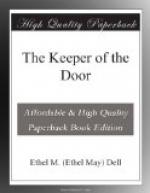She had no partner to take her in to supper, refusing each one that offered with the repeated declaration that she must wait for Nick. But Nick came not, and momentarily her uneasiness increased.
Sir Reginald came to her at last, his kindly face full of sympathy. “There is probably no occasion for alarm, my dear,” he said. “Come, give me the pleasure of your company at supper!”
She had to yield, for he would take no refusal; but she could eat nothing notwithstanding his utmost solicitude. She was in a state of mind to start at every sudden sound, and the food he put before her remained untasted on her plate.
Sir Reginald watched over her with fatherly concern, but he could do nothing to alleviate her anxiety. In his own private soul he shared it to a considerable degree.
As they left the supper-room together, she turned to him piteously. “Oh, do you think I might go back and see if he has returned? Really, I can’t—I can’t dance any more!”
“Wait a little longer!” he counselled. “You needn’t dance of course. Stay quietly with me! He may walk in at any moment.”
She longed to go, but could not refuse a suggestion so kindly proffered. She stayed with him therefore, glad of his protecting presence, refusing to dance any more on the plea of fatigue.
The whirling scene wearied her unspeakably. She found herself watching Noel, who was frankly flirting with every woman in the room. It was doubtless a safe pastime, but behind her gnawing anxiety a little spark of resentment kindled and burned. How hopelessly fickle he was!
Hunt-Goring had apparently removed himself from the gay company altogether, for she saw him not at all. His absence was the only palliating circumstance in that hour of sick suspense.
It was growing late and the remaining dances were few, when a native orderly entered the room and stepped up to Colonel Bradlaw, who was standing with Sir Reginald. He murmured a few low words to which the Colonel listened with a frown. It was his habit to frown always at the unexpected.
He turned after a moment to Sir Reginald. “There’s a messenger arrived from the Palace with a box of sweets or something. What?” breaking off ferociously as the orderly’s lips moved soundlessly.
“Moonstones, sahib,” murmured the orderly with deference.
“Moonstones,” repeated the Colonel, in a tone of vast contempt, “to be presented to the lady wearing the best make-up in the room. What on earth am I to do, sir?”
“Accept with thanks, I should say,” said Sir Reginald, with a smile.
“Oh, I don’t mean that,” said the Colonel, frowning still more. “But who the dickens is going to decide as to the merits of the ladies’ costumes? Not I—and not my wife! It’s too big a responsibility—that.”
Sir Reginald laughed. “That is a serious consideration, certainly. I should make them decide themselves. Vote by ballot. That ought to satisfy everyone.”




